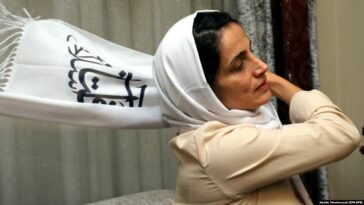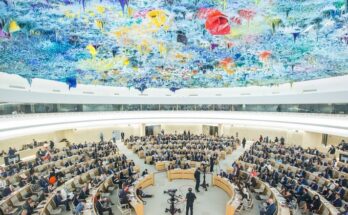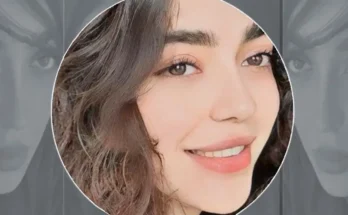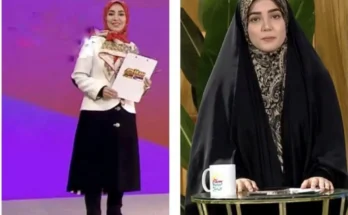By AIW Staff

In its November 7th issues, the French Publication, L’Obs – formerly Le Nouvel Observateur – has conducted a written interview with Nasrin Sotoudeh, Iranian lawyer, human rights activist and according to the Khomeinist regime, public enemy number one.
Sara Daniel, who undertook the assignment describes Sotoudeh as “a short-haired, pale, and petite woman who is shaking for her life every time she goes on a hunger strike to protest against his conditions of detention.”
Because she is a woman, because she questions the regime, because she contests the law imposing the wearing of the obligatory veil, but especially because she shows an almost supernatural determination, Nasrin Sotoudeh became the obsession with the mullahs’ regime.
When they arrested her again in June 2018, they sentenced her to 74 lashes for appearing without a veil in public, one year and six months in prison for “propaganda” against the state, two years for “disturbing public order”, three years and 74 other lashes for “dissemination of false information” to seven years and six months for “collusion for the purpose of harming national security”, at seven years and six months for belonging to an illegal group and finally at twelve for encouraging “corruption and depravity” that is to say, to have defended women who had their picture taken without a veil in Iran.
Although there is no law in Iran regarding compulsory hijab, the regime’s guards, morality police, and courts spend considerable resources enforcing veiling and proper Islamic dress. Daniel asks Sotoudeh about why the hijab is so fundamental to the Islamic Regime. Sotoudeh replies: “I really don’t know. I cannot even speculate. Ask the Islamic authorities. The freedom of choice is fundamental. In my opinion, forced veiling is an insult. For now, I am very troubled by what the future holds for my daughters.” She adds: “Being a female attorney working to defend people who are caught in injustice, is so much more painful than enduring the strain of imprisonment.”
“At a time where oppression reigns in Iran, it makes no difference whether I’m in prison, or not. In Iran, we are always prisoners. You probably think I’m exaggerating, but when our main concern is the absence of justice in our society, being imprisoned or not make no difference.”
In women’s ward in Evin prison, there are several ladies charged with espionage. Sotoudeh who was one of the signatories to a statement, demanding a referendum to decide the country’s future political system, believes that that is likely another reason for her imprisonment.
Sotoudeh has also defended her membership in LEGAM (Persian acronym for banning the death penalty), noting, “None of my actions were against the Islamic Republic’s laws. However, the powers that be, in Iran, do not tolerate such actions, and illegally prosecute anyone and everyone involved.”



